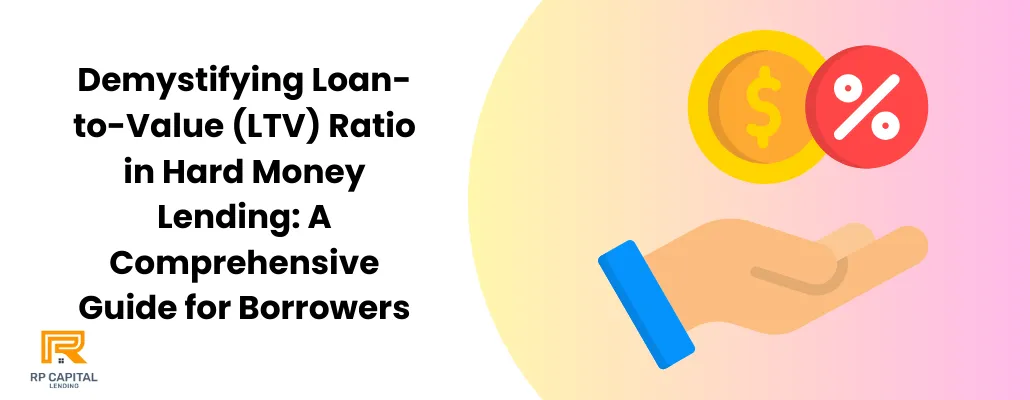Blog

Demystifying Loan-to-Value (LTV) Ratio in Hard Money Lending: A Comprehensive Guide for Borrowers
"Imagine unlocking a door to a room filled with potential and opportunities—that's what understanding the Loan-to-Value (LTV) ratio can do for your real estate ventures."
The world of hard money lending might seem daunting at first, but grasping the essence of the LTV ratio can significantly ease your path to securing the funds you need for your next project.
Let's dive into the heart of hard money lending and uncover how the LTV ratio can impact your borrowing capabilities.
What is the Loan-to-Value Ratio?
The Loan-to-Value (LTV) ratio is a critical term in the realm of real estate financing, particularly in hard money lending. It measures the loan amount as a percentage of the property's value, providing lenders and borrowers with a snapshot of the equity involved in a loan deal. Understanding LTV is crucial for anyone looking to navigate the hard money lending space effectively.
Key Points:
Definition: The LTV ratio is the loan amount divided by the property's appraised value, expressed as a percentage.
Importance: It determines the risk level for the lender and can significantly influence the loan terms, including interest rates and down payment requirements.
The Significance of LTV Ratio in Hard Money Lending
Hard money loans are secured by real estate assets, making the LTV ratio a pivotal factor in the lending decision. Lenders assess the LTV to gauge the risk associated with the loan. A lower LTV ratio signifies less risk, often leading to more favorable loan terms for the borrower.
Key Points:
Risk Assessment: Lenders use LTV to evaluate the risk of loan default. A high LTV ratio indicates a higher risk.
Loan Terms: The LTV ratio can influence the interest rate, loan amount, and other critical terms of the hard money loan.
How LTV Impacts Borrowing
Understanding the LTV ratio's impact on borrowing can empower you to negotiate better loan terms and make informed decisions.
Key Points:
Borrowing Capacity: A lower LTV ratio may increase your borrowing capacity, as it indicates more equity in the property.
Interest Rates: Generally, a lower LTV ratio results in lower interest rates, reducing the overall cost of the loan.
Optimizing Your LTV Ratio
Optimizing your LTV ratio is essential for securing favorable loan terms. Consider improving the property's value or increasing your down payment to lower the LTV ratio.
Key Points:
Property Improvement: Enhancing the property's value can lower the LTV ratio, making the loan less risky for lenders.
Down Payment: A larger down payment reduces the loan amount, thereby lowering the LTV ratio.
FAQs: Unraveling the Complexities of LTV in Hard Money Lending
1. What is considered a good LTV ratio in hard money lending?
A good LTV ratio is typically 70% or lower. This percentage indicates sufficient equity in the property, making the loan less risky for lenders.
2. Can I negotiate a better interest rate with a lower LTV ratio?
Yes, a lower LTV ratio often results in a more favorable interest rate, as it signifies lower risk for the lender.
3. Is it possible to get a hard money loan with a high LTV ratio?
While possible, loans with high LTV ratios come with higher interest rates and stricter terms due to the increased risk to lenders.
4. How can I calculate the LTV ratio for my property?
To calculate the LTV ratio, divide the loan amount by the property's appraised value, then multiply by 100 to get a percentage.
5. Does the LTV ratio affect the loan approval process?
Yes, the LTV ratio is a crucial factor in the loan approval process, influencing the lender's decision based on the perceived risk of the loan.
Conclusion: Empowering Your Financial Decisions
The Loan-to-Value ratio is more than just a financial metric; it's a tool that, when understood and utilized effectively, can significantly impact your borrowing experience in the realm of hard money lending.
By grasping the nuances of LTV, you empower yourself to make informed decisions, negotiate better loan terms, and ultimately, unlock the full potential of your real estate investments. Remember, in the world of finance, knowledge is not just power—it's profit.
Disclaimer: Loans only apply to non-owner occupied properties. Rates, terms and conditions offered only to qualified borrowers, may vary upon loan product, deal structure, other applicable considerations, and are subject to change at any time without notice.
Copyright © 2025. All Rights Reserved.


